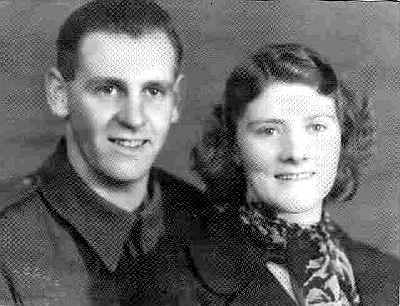







 I went overseas to the war in 1941. I was in the North Island and working at the Te Ngutu Cheese Factory at Okiawa. I went to the Middle East and the following year in July, I was taken Prisoner of War so the war years were spent behind barbed wire. I was in several camps in Italy where we were first put to work digging drains by hand through the paddocks 6 feet wide at the top with sloping walls tapering down to a foot wide at the bottom and about 4 feet deep to enable crops to be grown. The land was particularly wet and in winter, the drains that we dug, were full. We played sport, when given the chance and I was in the New Zealand All Black team in camp.
However, we were picked up by the
Germans and railed on to Austria. There, in one camp, we made concrete
blocks. Sometimes, we would forget to put the cement into the concrete and
sabotage the building construction. In another camp, near the end of the
war, we were employed filling in bomb holes around the railway yards. Each
night bombers would come over and blast the railway network. To keep the
trains operating they had us working in three shifts, 24 hours a day. We
took exception to this. The first night we refused and wouldn't leave the
camp. The second night, we again refused and they threatened us with the
S.S. On the third night, the S.S. came and it was a case of
having to go. We weren't marched to the job but made to run. There was a
heap of shovels and picks on the ground and as we took one, were hit with
a rifle - those holes were filled in fast. Then, as the war got closer, we
were put out on the road, and marched for about a fortnight. This gave us
some fun as the guards would break ranks and some would disappear to a
farm to get food. On one occasion, just as we were about half a mile from
our camp for the night, we passed a chap planting spuds and asked him for
some. He refused, so that night, went back and dug them up - he would be
wondering later about his poor strike!
We were released by the Americans in May 1945 and flown to
England where we had about six weeks before returning home to New Zealand.
I'd first had intentions of going farming in
the
Robert Douglas (Doug) Guilford (b: 18 Apr 1917 in Ashburton to parents Edward (Ted) Benbow Guilford and mother Madeline Edith Makeham; d: 08 Feb 2009 in Tauranga Hospital Crem: 12 Feb 2009) mar 28 May 1941 in Hawera to Miriam Winifred Florence (Flo) Luxton (b: 05 Jul 1917 in Tinwald; d: 03 May 1995 in Tauranga Crem: Tauranga July 6, 1995Their son: Murray Douglas Guilford mar: Yvonne Susan Houghton Their family:
|